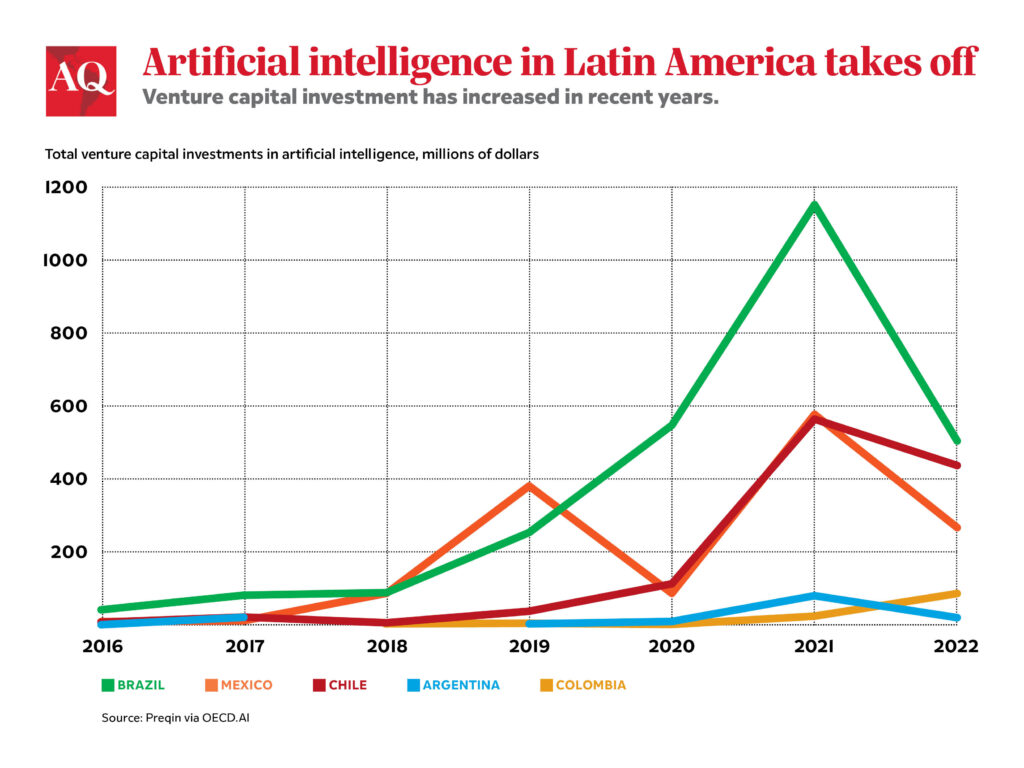The development of artificial intelligence (AI) holds immense potential for innovation across economic sectors worldwide. But this technology poses as many challenges as opportunities—and in Latin America, we’ve seen a patchwork of regulatory and institutional approaches emerge in various countries, rather than a coherent regional strategy. With AI’s potential to both help and hinder governments in strengthening democratic institutions, an AI strategy for the Americas that puts democratic principles and protection first will be critical in the years ahead.
Already, countries throughout Latin America are exploring the benefits AI strategies can provide. The Panamanian government’s Respuesta Operativa de Salud Automática COVID-19 app, which uses AI to diagnose and recommend a patient for COVID testing, is just one example of possibilities that range from formulating public policies focused on COVID-19 response, to security and strengthening transparency, integrity and accountability.
A regional AI strategy would provide a public policy framework, laying out a clear set of priorities for expanding AI’s positive effects and combating its potential for abuse. It would outline parameters and identify opportunities for ongoing dialogue. Ideally, it would include funding commitments to ensure goals are reached.
According to the OECD’s Observatory of Public Innovation, Argentina, Brazil, Chile, Colombia, Mexico, Peru and Uruguay have all either formulated or are developing an AI strategy, while Costa Rica has adopted the OECD’s own AI principles and recently committed to developing a national strategy. A coherent and rigorous regional process toward creating an AI policy is not only important for enhancing democratic governance, but also in strengthening the region’s competitive advantage.

And meanwhile, autocracies are wasting no time in exploring the malign potential of AI to help themselves maintain control and exercise regional influence. In Venezuela, the regime has used AI to generate English-speaking avatar newscasters to spread pro-regime propaganda. It also uses Chinese company ZTE’s technology to link identification cards to activities including voting behavior and the use of social services—adding a dangerous new layer to the country’s surveillance state.
A successful AI strategy must not only consider the ways in which AI can be used productively, but also guard against its many malign applications—and the geopolitical risks it entails. As noted in a recent report from the German Marshall Fund, in collaboration with the International Republican Institute, many of the cloud centers and physical infrastructure elements that artificial intelligence relies upon are provided by major Chinese state-owned and private companies, raising concerns over state surveillance.
A regional AI strategy: What and why
A set of regional guidelines are imperative to harness the true power of AI for good. Guidelines could help countries shore up good governance and increase democratic resilience and the quality of public service delivery. Initiatives such as the Alliance for Democratic Development (ADD)—established by Costa Rica, the Dominican Republic, Panama and Ecuador to bolster regional democracy—could serve as a platform to help governments across the region build both regional strategies and national frameworks. Already engaged in seeking multilateral solutions to regional issues—migration crisis, attracting foreign investment, strengthening institutions and the rule of law—the ADD is well-placed to add the role of technology and AI to its priorities.
AI strategy must grapple with the question of how governments can maintain a technological edge while conserving human rights and liberal democratic values. If AI can improve productivity for the private sector, it can also bring benefits for the public sphere—raising the efficiency and quality of public services like healthcare, education and anti-corruption initiatives—provided it is used within acceptable parameters.
In Paraguay, a communications agency created a simulated presidential debate in April 2023 after one of the candidates refused to participate in real debates. The artificial intelligence program (powered by ChatGPT, Narakeet and D-ID) used candidates’ history, social media comments and political platforms to allow citizens to “hear” from them. This project sought to provide better access to information on social media for youth, providing an opportunity to compare the capabilities of both candidates and determine who had the best policy proposals.
But AI can just as easily be used to generate a malicious, falsified election debate and spread disinformation. All the more reason for governments to tackle such problems through their elections authorities to protect against misuse of information and provide a degree of consistency to the process.
AI, democracy and rule of law
AI has the promise to become a powerful tool to tackle corruption, with many avenues to enhance democratic governance using open data and information access. Already, AI is a key tool in ongoing collaboration between Exiger and Transparency International in the UK seeking to improve the latter organization’s capacity to analyze public records and identify corruption risks.
The United States has a role to play in these efforts, supporting with early research and best practices exchanges, both essential to the initial phase of developing an AI strategy—then, governments, legislatures, civil society, the private sector and academia can take the lead.
Latin America and the Caribbean should adhere to international norms and policy environments such as the one offered by the OECD AI Observatory, which provides a space for dialogue, exchanges, policy guidance and analysis. There’s also room for regional political coordination within existing multilateral frameworks, like the OECD’s Global Parliamentary group on AI. In Latin America and the Caribbean, ParlAmericas, a network of Western Hemisphere legislatures, is leading a new regional Digital Caucus that seeks to include regional legislatures in the international discussion on AI.
The AI revolution presents enormous challenges and opportunities for Latin America—and the region has a compelling interest in deciding on, and pursuing, strategies that maximize the positive potential of AI tools and push back on their use for malign ends.
__
Garrastazu is the senior director for Latin America and the Caribbean at the International Republican Institute. De Anta is the Panama resident program director at the International Republican Institute.








